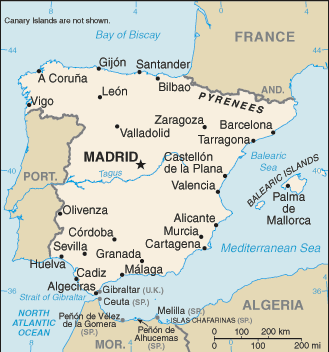Drug policy
The Spanish National Strategy on Addictions for 2017-24 addresses illicit drugs, new psychoactive substances, the licit trade in alcohol, tobacco and medicines with addictive potential, and behavioural addiction.
The strategy’s objectives include:
- delaying the age at first contact with dependence-producing substances and behaviours,
- reducing their availability and prevalence
- reducing associated harms.
The strategy is built around two basic goals, which are developed in several sub-goals.
The first goal seeks to achieve a healthier and better-informed society by diminishing drug demand and the prevalence of dependencies as a whole. This includes prevention and risk reduction; integrated and multidisciplinary care; harm reduction; and social integration.
The second goal aims to achieve a safer society by diminishing drug supply and controlling those activities that could lead to dependencies. This includes supply reduction, review of legislation, and judicial and law enforcement cooperation at both national and international levels.
Spain evaluates its drug policy and strategy using on-going indicator monitoring and specific research projects.
Treatment and Recovery Services
The public sector is the primary provider of treatment, followed by non-governmental organisations and private organisations.
A specific drug-dependence care network is widely distributed throughout the country. Therapeutic provision comprises outpatient and inpatient treatment networks.
The outpatient network includes:
- low-threshold services, mainly operating at the first care level and providing mental health screening for clients
- specialised drug treatment centres, including mental health units, operating at the secondary level and providing the backbone of the treatment system
The current National Strategy on Addictions 2017-24 includes among its key objectives the reduction of harm associated with the use of substances with addictive potential- these include needle and syringe programmes, take-home naloxone, drug consumption rooms and heroin-assisted treatment.
In Spain, a wide variety of social reintegration programmes and activities are also available, including
(i) leisure and social relationship programmes,
(ii) training programmes,
(iii) residential support programmes and resources (both transitory and permanent) and
(iv) employment grants.
Prevention Services
Prevention objectives include the reduction of visibility and promotion, limitation of accessibility and reduction of perception of normality.
Prevention interventions encompass a wide range of approaches.
Environmental interventions in Spain are the responsibility of the autonomous communities and municipal drug plans. They include:
- promoting safety in the nightlife environment
- addressing drunk driving
- Preventing alcohol consumption among minors
Universal prevention in Spain is mainly implemented in the educational sector, and it is focused on the development of personal and family competencies and skills.
A particular Spanish feature is the implementation, in all autonomous communities and cities, of alternative leisure-time programmes that seek to promote drug-free entertainment for minors and young people.
Prevention programmes in universities have emerged in recent years and focus mainly on information provision and awareness raising, using peer education methods or online delivery.
Selective prevention activities focus on young people in disadvantaged neighbourhoods and those in specific educational or residential centres. Activities include psychosocial attention and the development of psychoeducational skills.

